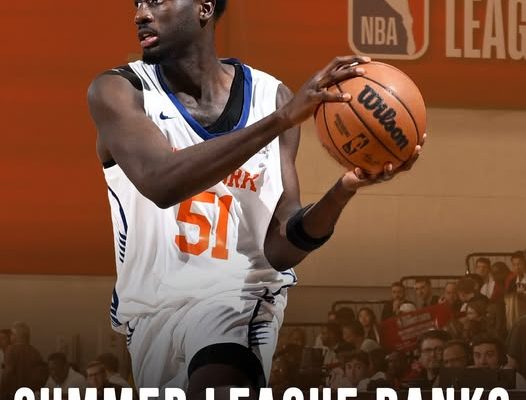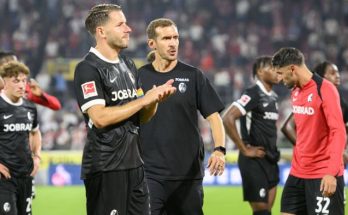Mohamed Diawara may not be a household name just yet, but if you’ve been paying attention to the New York Knicks’ 2025 NBA Summer League campaign, chances are you’ve seen the flashes of promise he’s shown on both ends of the court. The Summer League has always served as a proving ground for prospects, undrafted hopefuls, and players attempting to work their way into an NBA rotation. For Diawara, a long, rangy forward with raw tools and an intriguing feel for the game, this opportunity has provided a stage for him to showcase his developing skill set and evolving basketball IQ. His per-game rankings in key statistical categories suggest a player who is not just surviving among peers but thriving—and potentially carving a niche for himself on a team with playoff aspirations. To truly appreciate the significance of Diawara’s performance, one must dig into the numbers, understand the context of Summer League dynamics, and assess how his contributions fit into the broader narrative of development in the NBA.
For many basketball fans, Summer League stats come with an asterisk. After all, the competition isn’t as elite as the NBA’s regular season, and lineups often feature rookies, G-League players, or overseas prospects. But that doesn’t diminish the importance of this stage—especially for young talents who need to prove they belong. Mohamed Diawara entered this year’s Summer League as a relatively unknown commodity. Born in France and previously playing in Europe’s second-tier leagues, Diawara brought with him a reputation for defensive intensity and positional versatility. What he’s done over a five-game stretch for the Knicks is not just raise eyebrows—he’s stirred legitimate curiosity among scouts and analysts about whether he might be ready for a full-time NBA role.
Diawara’s per-game numbers in the 2025 Summer League read like a case study in controlled aggression. Averaging 13.8 points, 6.4 rebounds, 2.6 assists, 1.4 steals, and 1.2 blocks per game, he ranked within the top 10 in nearly every statistical category among forwards. But it’s not just the raw averages that are impressive—it’s the impact those numbers had within the flow of each game. He wasn’t just racking up empty stats in garbage time. Diawara played meaningful minutes, often finishing games and logging tough defensive assignments. The Knicks coaching staff trusted him to do more than just run up and down the floor. They empowered him to make reads, switch on screens, handle the ball in transition, and even operate out of the short roll. That kind of responsibility doesn’t come easily. It’s earned through preparation, communication, and a mature grasp of the game—qualities Diawara is beginning to display with regularity.
His scoring efficiency is perhaps the most encouraging sign. Shooting 51.6% from the field and 38.9% from three-point range on just under four attempts per game, Diawara has shown he can be a reliable shooter in catch-and-shoot situations, and he’s also capable of creating his own shot when needed. The modern NBA craves players who can space the floor, and the ability to hit threes at that clip suggests his mechanics are fundamentally sound. What makes his shooting more impressive is the confidence with which he’s taking those shots. Diawara is not hesitating or second-guessing himself—he’s stepping into jumpers in rhythm, using screens effectively, and leveraging his length to get shots off against tight coverage. That bodes well for his transition to the NBA, where defenders are longer, quicker, and more disciplined.
Rebounding has also been a strong suit for Diawara, who ranks in the top 15 for total rebounds per game among Summer League forwards. He’s not just collecting boards that fall into his lap; he’s pursuing rebounds in traffic, boxing out bigger opponents, and showing an excellent nose for tracking the ball off the rim. On the offensive glass, his instincts are particularly sharp. He averaged 2.2 offensive rebounds per game, often creating second-chance opportunities that shifted momentum in the Knicks’ favor. Those kinds of hustle plays aren’t always glamorous, but they win games—and they earn you a spot in an NBA rotation.
Passing and playmaking often separate the good from the great when it comes to forwards, and Diawara is starting to show signs of becoming a capable facilitator. With 2.6 assists per game, he’s not running the offense, but he’s making smart decisions in the halfcourt. Whether it’s hitting cutters from the elbow, swinging the ball quickly to an open shooter, or driving and kicking out to the perimeter, Diawara is proving that he understands spacing and timing. These are skills that are cultivated over time, especially for players who didn’t grow up in the American AAU system where offensive flow is emphasized. His European background may have contributed to his team-first mentality, and it shows in the way he plays the game—unselfish, deliberate, and fundamentally sound.
Defense, however, is where Diawara’s Summer League campaign truly stands out. Averaging 1.4 steals and 1.2 blocks per game, he ranked in the top five for forwards in both categories. But raw numbers alone don’t do justice to his defensive impact. Diawara’s 7-foot wingspan allows him to disrupt passing lanes and challenge shots without fouling. He’s quick enough to switch onto guards and long enough to contest big men in the paint. He rarely bites on pump fakes, communicates well on pick-and-rolls, and recovers quickly when beaten off the dribble. In short, he’s the kind of switchable defender that modern NBA teams covet. If his defensive instincts continue to sharpen, Diawara could find himself guarding multiple positions at the next level—an invaluable trait for any team looking to contend.
Basketball IQ is often a nebulous concept—difficult to quantify but easy to recognize when you see it. Diawara’s reads on both ends of the floor reflect a player who is thinking the game at a high level. He rotates early on defense, calls out assignments, and positions himself to help without overcommitting. On offense, he doesn’t force bad shots or over-dribble. He understands when to push the pace and when to slow it down. He’s not a star in isolation, but he makes winning plays that help his team stay organized. That ability to play within a system while still exerting individual influence is a rare quality in young players, especially those new to American basketball.
When you compare Diawara’s per-game ranks to those of other forwards in the 2025 Summer League, his standing is impressive. He’s among the top 10 in scoring efficiency, top 15 in rebounding, top 5 in combined steals and blocks, and top 20 in assists. He’s one of just four forwards to average over 13 points, 6 rebounds, 2 assists, and 1 steal per game. That kind of well-rounded production is a strong indicator that he isn’t just excelling in one facet of the game—he’s impacting every area.
What also helps elevate Diawara’s profile is the trajectory he’s following. Each game he’s played has shown incremental improvement. His early outings featured hustle and defense, but by Game 3, he started taking more initiative offensively, becoming more assertive in transition and showing off a pull-up jumper that wasn’t in the scouting report. By Game 5, he was confidently initiating sets, communicating more with teammates, and showing leadership that doesn’t always manifest in box scores. That kind of upward trend matters. It shows coachability, work ethic, and adaptability—key ingredients for a successful NBA transition.
The Knicks have always been a franchise that values grit and toughness, and Diawara seems to embody those characteristics. He plays hard, doesn’t back down from challenges, and carries himself with a quiet confidence that resonates with coaches and teammates alike. Though the Knicks’ current roster features several established wings and forwards, the door is not closed for a player like Diawara to earn minutes. Injuries, trades, and performance slumps are part of the NBA landscape, and a player who can step in and contribute on both ends of the floor will always have value. If Diawara earns a two-way contract or G-League assignment with the Westchester Knicks, it would be a wise move to keep him within the system, allowing for development under the same philosophical and strategic umbrella as the parent team.
Perhaps what makes Diawara’s Summer League rise most fascinating is the context in which it occurred. He wasn’t a lottery pick or even a first-round prospect. He didn’t have hype machines fueling his ascent. Instead, he relied on production, consistency, and substance over flash. That appeals to old-school basketball minds and analytics departments alike. Whether he sticks in the NBA or continues to hone his craft overseas, his Summer League numbers suggest a player who is trending upward, not plateauing.
There’s also a cultural dimension to Diawara’s journey. As a French-born player, he joins a growing wave of international talent making inroads into the NBA. From Victor Wembanyama to Bilal Coulibaly, the league is witnessing an infusion of European prospects who bring a different approach to the game—one built on fundamentals, team play, and tactical discipline. Diawara may not have the star ceiling of a Wembanyama, but his skill set is tailor-made for the modern NBA. Versatility, defense, efficiency, and humility—that’s the formula that keeps players on rosters and helps teams win games.
The New York Knicks now have a decision to make. Diawara’s Summer League performance has certainly put him on the radar, but how they choose to manage his development will say a lot about the organization’s vision for the future. Do they bring him into training camp with the intent of testing him against NBA-level competition? Do they stash him internationally for one more year of seasoning? Or do they gamble on his upside and sign him outright, trusting their development staff to polish the raw edges?
No matter what path he takes, Mohamed Diawara has proven that he belongs in the conversation. His per-game Summer League ranks aren’t just statistical footnotes—they’re evidence of a young player beginning to figure it all out. The Knicks may have uncovered a diamond in the rough, and as the franchise looks to build sustainable success, investing in high-upside prospects like Diawara could prove to be the smart, forward-thinking move. He’s not just another name on the Summer League roster. He’s a player with potential, purpose, and a performance sheet that demands attention.



